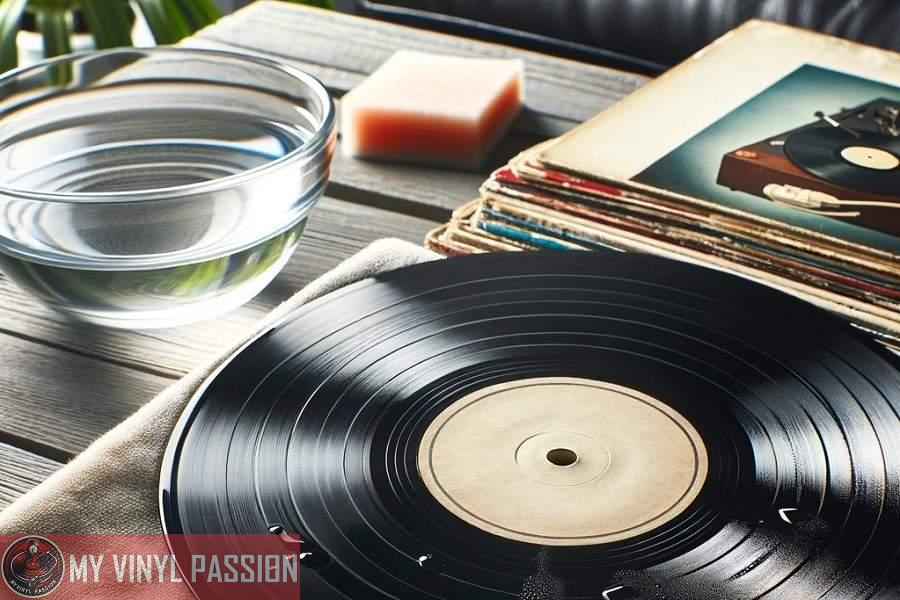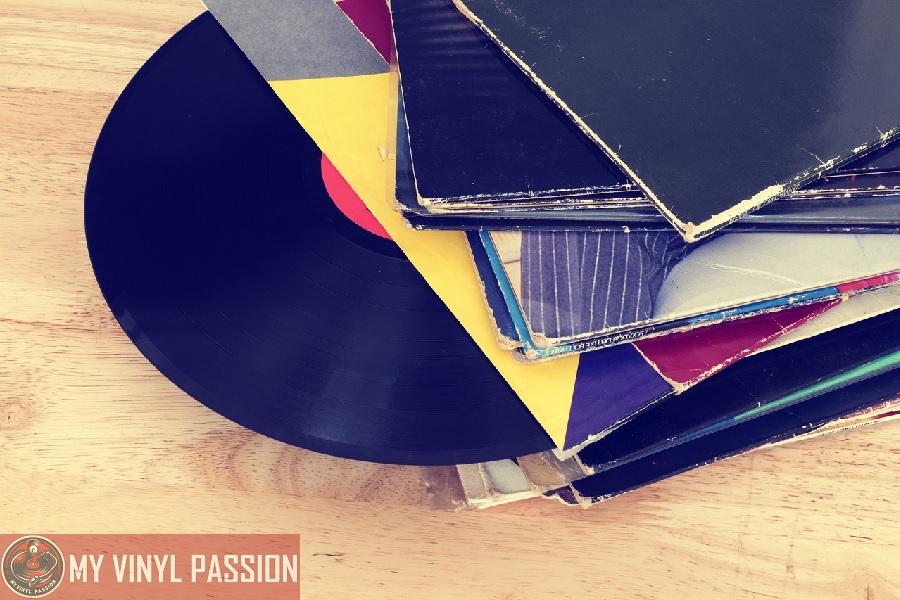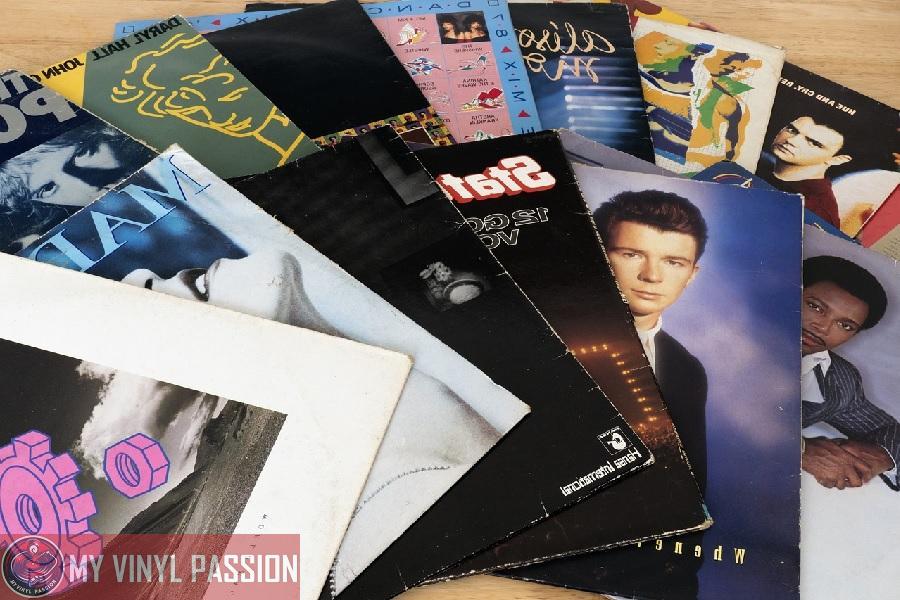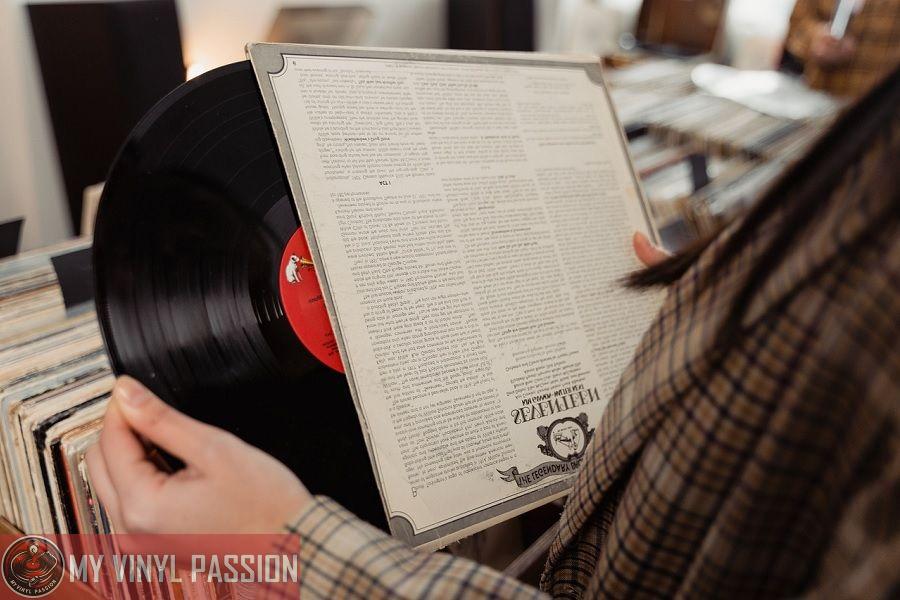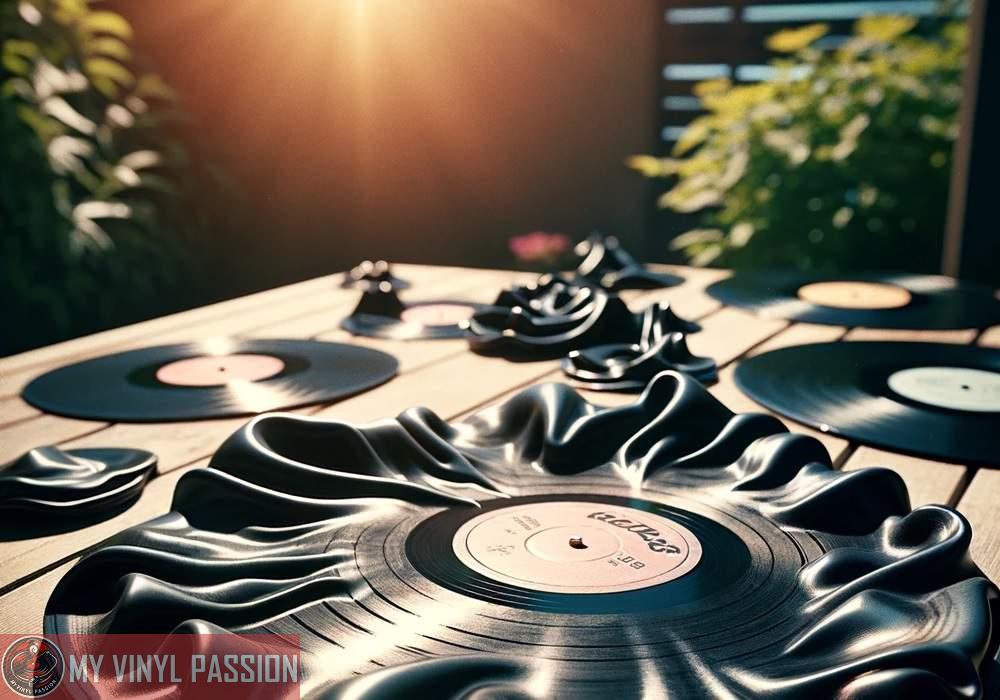Vinyl records have made a comeback in recent years, with music enthusiasts striving to maintain the quality and longevity of their precious collections. One common concern is the cleanliness of these records, as dirt and dust can accumulate over time and potentially damage the grooves.
Although there are various cleaning methods available, using water to cleanse vinyl records is a topic that raises questions about its safety and effectiveness.
To determine whether it is indeed safe to clean vinyl records with water, it’s essential to understand the material they’re made from and the potential consequences of using water-based cleaning techniques.
This understanding will offer insights into the proper selection of cleaning solutions and methods, ensuring the best way to maintain your treasured collection while preventing damage. Taking care of your vinyl records, cleaning and storing them properly, will enable you to enjoy their superior sound quality for years to come.
In Summary
Understanding vinyl record materials and cleaning frequency is crucial to prevent damage.
Use distilled or deionized water, and avoid harsh scrubbing when cleaning your records.
Proper drying, handling, and storage are vital to protect vinyl records from contamination.
Understanding Vinyl Record Materials
Importance of Proper Care
Caring for your vinyl records is essential to maintain their quality and longevity. Dust, dirt, and fingerprints can get trapped in the grooves, causing a less enjoyable listening experience. So it’s crucial to clean your records regularly and use the right materials and techniques to avoid any potential water damage.
Composition and Sensitivity to Water
Vinyl records are made of polyvinyl chloride (PVC), which is a type of plastic. This material is relatively resistant to water, but it can be sensitive to certain chemicals or contaminants commonly found in tap water. Using unpurified water to clean your records can leave unwanted residue on the vinyl surface, making it essential to use distilled or deionised water when cleaning your records. According to Vinyl Club, it’s safe to clean vinyl records with water, but using distilled or deionised water is highly recommended.
Remember to also avoid abrasive materials, such as paper towels or brushes with stiff bristles, as they can potentially damage the record’s grooves. Following proper cleaning and storage practices will ensure that your vinyl records remain in good condition for years to come.
When to Clean Your Vinyl Records
Identifying Dirt and Debris
It’s essential to inspect your vinyl records regularly to identify any accumulated dirt and debris. Look for visible signs of dust and grime on the grooves and the record surface. A buildup of dust can affect the sound quality and potentially damage your needle or stylus. Here are some common indicators that a record needs cleaning:
- Visible dust: Look for a thin layer of dust covering the grooves.
- Fingerprints: Fingerprints can easily transfer oil and dirt to the grooves.
- Sticky residue: Spills or other contaminants may leave a residue on the record surface.
To effectively clean your vinyl records, ensure that you have the necessary cleaning materials and follow the recommended cleaning methods.
Recognizing Static and Noise Issues
In addition to visible dirt and debris, static electricity and surface noise can also impact the sound quality of your vinyl records. When handling records, it’s crucial to be aware of these common issues:
- Static electricity: Static can attract dust and cause pops and clicks while playing. Try using an anti-static brush before and after playing records to minimize the buildup of static electricity.
- Surface noise: This includes pops, clicks, and crackles that are not part of the recorded music. Surface noise is often caused by dirt and debris in the grooves, so cleaning your vinyl records regularly can reduce these unwanted sounds.
Remember to clean your vinyl records whenever you notice visible dirt or experience any noise issues, and always handle them with care. By regularly inspecting and maintaining your records, you can enjoy the best possible listening experience.
Choosing the Right Cleaning Solutions
When it comes to cleaning your vinyl records, it’s essential to choose the right cleaning solutions to preserve the quality and longevity of your collection. In this section, we will discuss the pros and cons of using water, alternatives to tap water, and other cleaning solutions.
Pros and Cons of Water
Pros:
- Accessibility: Tap water is readily available in most households, making it a convenient option for cleaning vinyl records.
- Cost-effective: Unlike specialized record cleaning solutions, using tap water is an inexpensive method.
Cons:
- Potential contaminants: Tap water may contain contaminants, such as minerals, chlorine, and other impurities that can harm your records.
- Possible residue: Evaporation of tap water can leave behind a residue on the record surface, compromising sound quality.
Overall, while tap water is an easy and cost-effective choice, it may not be the best option for cleaning vinyl records due to potential damages that can occur.
Alternatives to Tap Water
Distilled Water:
A better option than tap water is distilled water, as it contains no impurities or contaminants. Distilled water will not leave any residue on the record’s surface, preserving the sound quality.
Cleaning Solutions:
Commercially available record cleaning solutions and vinyl cleaning solutions are designed specifically for cleaning and maintaining vinyl records. One such solution is GrooveWasher G2 Fluid, which is a single-step cleaning method that leaves no residue behind, avoiding the need for any secondary rinse.
Alcohol-free Solutions:
For those concerned about using alcohol-based cleaning agents, alcohol-free options are available. Alcohol-free cleaning fluids minimize the risk of damaging the record’s surface or the label.
Isopropyl Alcohol:
Another popular option is using isopropyl alcohol in a homemade cleaning solution. But, if you choose to use isopropyl alcohol, make sure it’s a high-purity solution (ideally 99% isopropyl) and mixed with distilled water. Exercise caution when using isopropyl alcohol, as it can dissolve some label inks and damage the record label.
When selecting a cleaning solution for your vinyl records, consider the pros and cons of each option and choose one that best suits your needs and preferences. Proper care of your vinyl records will ensure they remain in good condition and sound great for years to come.
Effective Water-Based Cleaning Techniques
Manual Cleaning with Water
One method to clean vinyl records with water is using distilled or deionized water, which is free of minerals and impurities that can leave residue on your records. Tap water, on the other hand, may contain minerals and additives that can harm your vinyl. When cleaning manually, start by laying your record on a soft, flat surface. Apply a small amount of water to the problem areas, and work gently in the direction of the groove with circular motions until the debris is gone.
Here are some tips for manual cleaning with water:
- Use only distilled or deionized water: Tap water may leave residue due to its mineral content.
- Avoid the inner label: Be cautious not to get the label wet during cleaning.
- Use a soft, lint-free cloth: This helps prevent scratches on your vinyl.
Using Record Cleaning Machines
Another effective water-based cleaning technique is using a record cleaning machine (RCM). These machines are specifically designed for cleaning vinyl records and can provide a more thorough wet cleaning process3. RCMs typically use a cleaning solution that can be water-based, making them suitable for the task.
When using a record cleaning machine, follow these simple steps:
- Remove dust: Use an anti-static brush to remove dust from your vinyl before placing it in the machine.
- Apply the cleaning solution: Make sure to use the appropriate water-based cleaning fluid as recommended by the manufacturer.
- Start the cleaning process: Allow the machine to clean your record according to the manufacturer’s instructions.
- Dry the record: After cleaning, let your record air-dry or use the machine’s built-in drying function if available.
Bothm manual cleaning with water and using record cleaning machines are effective water-based cleaning techniques for your vinyl records. Make sure to use distilled or deionized water in manual cleaning, and follow the manufacturer’s instructions when using a record cleaning machine for the best results.
Proper Drying and Handling Post-Wash
Avoiding Water Residue
After cleaning your vinyl records with water, it’s essential to dry them thoroughly to prevent water residue or damage. One effective method is using a microfiber cloth to gently absorb the remaining moisture from the record’s surface. Lay the record on a flat, clean surface, and gently pat it dry, making sure to follow the grooves’ direction.
If you prefer a hands-free approach, consider using a clean dish rack to hold the records upright and let them air dry. Remember to place the dish rack on a clean and stable surface to avoid introducing new contaminants.
Handling Vinyl Records Correctly
Proper handling of your vinyl records is crucial to prevent damage and ensure their longevity. Here are some tips for handling your records correctly:
- Always hold the record by its edges or label area. Avoid touching the grooves, as the oils from your fingers can attract dust and dirt.
- Use a clean and dry microfiber cloth to remove any remaining dust or particles from the record’s surface before playing or storing it.
- When storing records, place them vertically and avoid stacking them horizontally. This helps prevent warping and unnecessary pressure on the vinyl.
By following these guidelines for proper drying and handling, you can maintain the quality and performance of your vinyl records.
Protecting Vinyl Records from Future Contamination
In order to keep your vinyl records in the best condition possible, it’s important to follow proper storage guidelines and conduct regular maintenance and dusting. This section will provide you with the necessary information to protect your records from contamination and ensure that they remain in pristine condition.
Proper Storage Guidelines
When storing your vinyl records, it’s essential to use inner and outer sleeves to provide adequate protection. Inner sleeves should ideally be made of anti-static material, as it helps prevent the buildup of static charge that attracts dust. Outer sleeves made of plastic or acid-free paper can further safeguard the records from dust, moisture, and scratches.
Make sure to store your records vertically and avoid stacking them, as this can lead to warping or other damage. Keep them in a cool, dry place away from direct sunlight, as excessive heat and humidity can cause deterioration of the vinyl and its cover art.
Regular Maintenance and Dusting
Establishing a regular cleaning routine is crucial for preserving the quality of your vinyl records. By performing maintenance and dusting prior to each play, you can prevent the buildup of dust and debris that may cause unwanted noise and potentially damage the stylus.
Here’s a simple guide for regular cleaning and dusting:
- Use a dedicated record brush or microfiber cloth to gently wipe the surface of the record in a circular motion, following the direction of the grooves.
- Ensure that you clean the stylus as well, using a stylus brush or a specialized cleaning solution. Accumulation of dust on the stylus can negatively impact the sound quality and may cause damage to your records.
- For more in-depth cleaning, consider using a vinyl record cleaning solution and a brush. This can help remove stubborn dirt and grime from the grooves without damaging the vinyl.
By following these proper storage guidelines, and conducting regular maintenance and dusting, your vinyl records will remain well-protected from future contamination.
Assessing Risks: When Not to Use Water
Potential for Mold and Warping
Using water to clean your vinyl records might seem like an easy solution, but it comes with its own set of risks. One of the primary concerns is the potential for mold growth. If you don’t properly dry your records after cleaning with water, you create a damp environment that encourages mold to develop. Mold can cause irreversible damage to the grooves of your vinyl, affecting the sound quality and rendering them unplayable.
Another risk associated with using water is warping. Vinyl records are susceptible to heat and moisture, and prolonged exposure to water may cause them to warp. Warped records will not play correctly, and in some cases, become unplayable. To avoid warping, always ensure that your records are completely dry before playing or storing them.
Risk of Label Damage
Besides mold growth and warping, cleaning your vinyl records with water can also lead to label damage. Vinyl record labels are typically made of paper, which can easily disintegrate or become discolored when exposed to water. It is crucial to avoid getting the label wet when cleaning your records with water.
In summary, using water to clean your vinyl records comes with several risks, including mold growth, warping, and label damage. Ensure that you properly dry your records and avoid getting the labels wet if you decide to use water for cleaning. Always consider alternative methods, such as specialized vinyl cleaning solutions, to safeguard your records and preserve their quality.
Supplemental Tools and Accessories for Cleaning
Using Brushes and Cloths
When cleaning your vinyl records, using the right brushes and cloths can make a big difference. A carbon fiber brush is a popular choice because of its ability to remove static and dust effectively. Carbon fiber brushes are specifically designed for cleaning records and they help maintain the quality of your collection.
In addition to a carbon fiber brush, you should also consider using a microfiber cloth. Microfiber cloths are gentle and do not scratch the delicate surface of a vinyl record; they also effectively remove dirt, fingerprints, and other contaminants. Remember to handle your records by the edges to prevent the transfer of oils from your fingers.
Benefits of Specialized Cleaning Kits
Sometimes, using a vinyl record cleaning kit can provide the best results when it comes to maintaining your precious collection. These kits usually contain:
- A cleaning brush or an anti-static brush for removing dust and debris.
- A cleaning solution specifically formulated for vinyl records.
- A microfiber cloth for drying and polishing the record.
- Detailed instructions on how to clean your records effectively and safely.
These specialized cleaning kits can offer a more thorough and systematic cleaning process, ensuring that your records remain in optimal condition.
When cleaning your records, be mindful of the materials you use, as some substances can cause damage. For instance, avoid using water alone, as it can leave residue and cause your records to deteriorate. Instead, look for cleaning solutions or kits specifically designed for vinyl records to achieve better results and maintain the quality of your collection.
Professional Cleaning Services and Best Practices
When to Seek Professional Help
It is beneficial to seek professional cleaning services for your vinyl records when you notice a decline in sound quality, or if your records are exposed to excessive dust, dirt, or contaminants. Professional services use specialized tools and cleaning solutions that ensure the preservation of your records’ sound quality and structural integrity.
Another reason to consult a professional cleaner is to address difficult-to-remove contaminants, or if your records have been mishandled or damaged. Professionals have the experience and knowledge to identify proper cleaning techniques that can restore the quality and longevity of your vinyl records.
Adopting Best Practices for Longevity
To maintain the quality and longevity of your vinyl records, adopt these best practices:
- Use the right cleaning solutions: Utilize distilled or deionized water to minimize the risk of introducing impurities or minerals onto the record surface. As an added precaution, avoid using tap water, alcohol, and harsh chemicals.
- Handle with care: Always hold your records by the edges and avoid touching the grooves. The natural oils and contaminants present on your hands can transfer to the record and affect its sound quality.
- Store properly: Keep your records in a cool, dry place away from direct sunlight. Store them vertically and never stack them as it can cause warping and irreversible damage. Use anti-static inner sleeves and sturdy outer covers to protect your records from dust and damage.
- Clean regularly: Develop a habit of cleaning your vinyl records after every few plays. Use a carbon fiber brush to remove loose dust and debris, and follow a proper hand-cleaning technique outlined in the guide.
By following these best practices, you ensure the preservation of your vinyl records’ sound quality, allowing you to enjoy your music experience for years to come.
Frequently Asked Questions
What is the safest method for cleaning very dirty vinyl records?
The safest method for cleaning very dirty vinyl records is by using a specialized vinyl record cleaning solution or a mixture of 95% distilled water and 5% alcohol. Apply it with a soft, lint-free cloth in a circular motion, following the grooves. Avoid using tap water as it may contain minerals that could harm the record. You can also use a record cleaning pad for a more effective clean.
Can household items like Dawn dish soap be used safely on vinyl records?
Yes, you can use a small amount of mild liquid dish soap like Dawn mixed with distilled water to clean vinyl records. Make sure to rinse the record thoroughly with distilled water to remove any soap residue. Be extra careful to avoid the label area while cleaning, as soap and water may damage it.
What are the risks of using vinegar as a cleaning agent for vinyl records?
Vinegar is an acidic solution and may harm the vinyl, causing it to lose its original gloss or affect the grooves, which may result in unwanted surface noise and diminished audio quality. It is recommended to stick to specialized cleaning solutions or a mixture of distilled water and alcohol for cleaning vinyl records.
Is it possible to effectively clean vinyl records with Windex, or should it be avoided?
Windex contains ammonia and other chemicals that may cause damage to vinyl records. To avoid any potential harm, it is better to use a specialized vinyl record cleaning solution or a mixture of distilled water and alcohol instead.
How should vinyl records be dried properly to avoid damage after washing?
After cleaning your vinyl records, gently dab them with a soft, lint-free cloth or a microfiber cloth to remove excess water. Never rub the cloth against the record, as it may scratch the surface. You can also use a record drying stand or allow the records to air dry in a vertical position.
What frequency is recommended for wet cleaning vinyl records to maintain their quality?
The frequency for wet cleaning vinyl records may vary depending on how often you play them and the conditions they are stored in. It is generally recommended to clean your records every few months or at least once a year. Clean your records before the first play and after multiple plays to ensure they remain in optimal condition.
